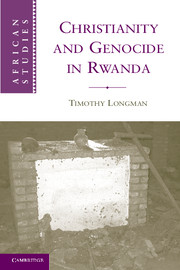Crossref Citations
This Book has been
cited by the following publications. This list is generated based on data provided by Crossref.
Uvin, Peter
2010.
Structural causes, development co-operation and conflict prevention in Burundi and Rwanda.
Conflict, Security & Development,
Vol. 10,
Issue. 1,
p.
161.
Safari, Peter
2010.
Church, State and the Rwandan Genocide.
Political Theology,
Vol. 11,
Issue. 6,
p.
873.
Jones, Ben
2011.
The Blackwell Companion to Religion and Violence.
p.
498.
Hitchcott, Nicki
2012.
Benjamin Sehene vs Father Wenceslas Munyeshyaka: the fictional trial of a genocide priest.
Journal of African Cultural Studies,
Vol. 24,
Issue. 1,
p.
21.
Burchardt, Marian
Patterson, Amy S.
and
Rasmussen, Louise Mubanda
2013.
The politics and anti-politics of social movements: religion and HIV/AIDS in Africa.
Canadian Journal of African Studies / Revue canadienne des études africaines,
Vol. 47,
Issue. 2,
p.
171.
Williamson, Caroline
2014.
Posttraumatic growth and religion in Rwanda: individual well-being vs. collective false consciousness.
Mental Health, Religion & Culture,
Vol. 17,
Issue. 9,
p.
946.
Burnet, Jennie E.
2015.
The Wiley Blackwell Encyclopedia of Race, Ethnicity, and Nationalism.
p.
1.
Temoney, Kate
2017.
Religion and Genocide Nexuses: Bosnia as Case Study.
Religions,
Vol. 8,
Issue. 6,
p.
112.
Piton, Florent
and
Adjemian, Boris
2018.
Rwanda : pour une histoire des violences de masse dans la longue durée.
Études arméniennes contemporaines,
p.
105.
Denis, Philippe
2018.
Grief and Denial among Rwandan Catholics in the aftermath of the Genocide against the Tutsi.
Archives de sciences sociales des religions,
p.
287.
Patterson, Amy S.
2018.
When to Speak? Church Advocacy onGalamseyand Mental Health in Ghana.
The Review of Faith & International Affairs,
Vol. 16,
Issue. 1,
p.
37.
Burnet, Jennie E.
2018.
A Companion to the Anthropology of Death.
p.
205.
Brehm, Hollie Nyseth
Uggen, Christopher
and
McElrath, Suzy
2018.
A Dynamic Life-course Approach to Genocide.
Social Currents,
Vol. 5,
Issue. 2,
p.
107.
Williams, Timothy P.
2019.
The Things They Learned: Aspiration, Uncertainty, and Schooling in Rwanda’s Developmental State.
The Journal of Development Studies,
Vol. 55,
Issue. 4,
p.
645.
McClendon, Gwyneth H.
and
Riedl, Rachel Beatty
2019.
From Pews to Politics.
Viebach, Julia
2020.
Mediating ‘absence-presence’ at Rwanda’s genocide memorials: of care-taking, memory and proximity to the dead.
Critical African Studies,
Vol. 12,
Issue. 2,
p.
237.
Kevin, Muriithi Ndereba
2021.
Towards a Kenyan political theology: The importance of church history for contemporary public life.
African Journal of History and Culture,
Vol. 13,
Issue. 2,
p.
102.
Le Pape, Marc
and
Vidal, Claudine
2021.
Violences extrêmes. Enquêter, secourir, juger.
p.
9.
Longman, Timothy
2021.
Violences extrêmes. Enquêter, secourir, juger.
p.
29.
Mariot, Nicolas
2021.
Violences extrêmes. Enquêter, secourir, juger.
p.
77.





